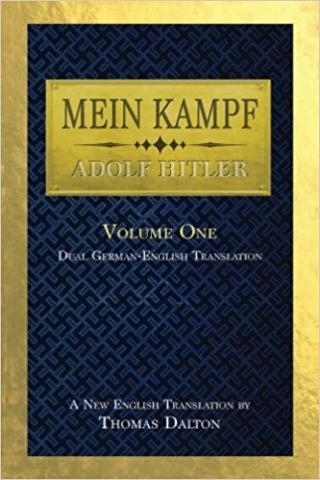Adolf Hitler on 'The World War'
 Continuing with passages from Mein Kampf, 2017 Thomas Dalton translation. See here.
Continuing with passages from Mein Kampf, 2017 Thomas Dalton translation. See here.
We now move on to Chapter 5: The World War. Hitler had been living and working in Munich for two and a half years when the war came. He tells how the situation appeared to him and how that led him to enlist at the first opportunity. His mistrust of the Slavs and dislike of multiculturalism continues to be part of his thinking.
P 321 5.2 THE GERMAN WAR FOR FREEDOM
The moment the news of the assassination [of Franz Ferdinand and his wife Sophie -cy] reached Munich, two thoughts came into my mind. First, that war was absolutely inevitable, and second, that the Habsburg State would now be forced to honor its alliance. What I had most feared was that one day Germany itself, perhaps as a result of the alliance, would become involved in a conflict not directly caused by Austria. In this case, Austria might not be able to muster the will to fight on behalf of its ally. The Slavic majority in the empire would have immediately begun to undermine any such intentions, and would have always preferred to shatter the entire state rather than to aid its ally. But now this danger was removed. The old state was compelled to fight, whether it wished to or not.
My own attitude towards the conflict was equally simple and clear. I believed that it wasn't a case of Austria fighting to get satisfaction from Serbia, but rather a case of Germany fighting for her own existence—for the life or death of the German nation, for its freedom and for its future. Bismarck's work must now be carried on. Young Germany must show itself worthy of the blood shed by our fathers on so many heroic battlefields from Weissenburg to Sedan and Paris. And if this struggle should bring us victory, our people will again rank foremost among the great nations. Only then could the German Reich assert itself as the mighty champion of peace, without needing to restrict the daily bread of its children for the sake of maintaining the peace.
[…]
I left Austria principally for political reasons. Even more rational, however, was that, now that the war had begun, that I should put into practice the logical consequences of my political opinions! I had no desire to fight for the Habsburg cause, but I was prepared to die at any time for my own people and the Reich to which they belonged.
Hitler then writes briefly about his enlistment and the march to the Front, which he calls Baptism by Fire, followed by this:
P 327 5.5 FROM YOUNG VOLUNTEER TO OLD SOLDIER
After four days in the trenches, we came back. Even our step had changed. Boys of 17 now looked like men.
The volunteers of the List Regiment may not have learned how to fight properly, but they knew how to die like old soldiers.
That was the beginning.
And thus we carried on from year to year. A feeling of horror replaced the romantic fighting spirit. Enthusiasm gradually cooled down, and exuberant spirits were quelled by the fear of ever-present death. A time came for each of us to experience the conflict between the urge to self-preservation and the call of duty. I, too, had to go through that conflict. As death unrelentingly sought its prey everywhere, a vague something rebelled within the body. It tried to pass as common sense; but in reality, it was fear. Fear took on this cloak in order to impose itself on the individual. Yet the more this voice called for caution, and the louder and more persistent its demands, the stronger our resistance became. Finally, the internal struggle was over, and the call of duty was triumphant. By the winter of 1915-1916, I had come through that inner struggle. My will had asserted its indisputable mastery.
In the early days, I went into the fight with a cheer and a laugh. Now, however, I was calm and resolute. And that frame of mind endured. Fate could now put me to the final test without my nerves or reason giving way.
The young volunteer had become an old soldier
This same transformation took place throughout the whole army. Constant fighting had aged, toughened, and hardened it, so that it stood firm and dauntless against every assault.
Only now is it possible to judge that army. After two or three years of continuous fighting and having been thrown into one battle after another, bravely facing superior numbers and superior armament, suffering hunger and privation, the time had come when one could assess the value of that singular fighting force.
For a thousand years to come, no one will dare to speak of heroism without recalling the German Army of the World War. And then, from the dim past, there will emerge an immortal vision of those solid ranks of steel helmets that never flinched and never faltered. As long as Germans live, they will be proud to remember that these men were the sons of their people.
'The World War' to be continued
Tags
Mein Kampf, MKVolICategory
Adolf Hitler, European History, Mein Kampf, World War 1- Printer-friendly version
- 1100 reads









